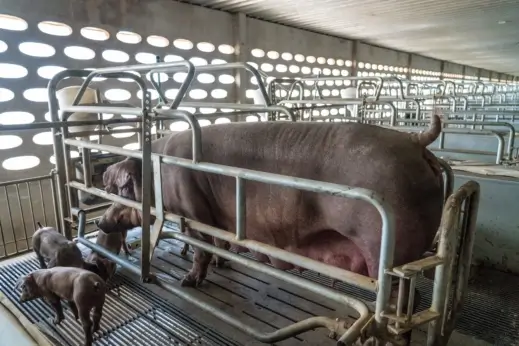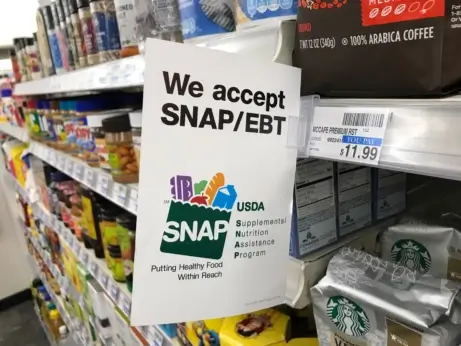What’s on the table: weakened climate funding, props to factory farms, cuts to SNAP and what you can do about it.

Despite the name, the Farm Bill doesn’t only affect farmers. If you eat food, the Farm Bill impacts you. It has huge implications for food production, nutrition assistance, animal welfare, the environment, trade and much more. It’s one of the most important pieces of legislation and is negotiated every five to seven years. As we reported in October, the US Congress failed to pass a new Farm Bill by the September 30, 2023 deadline. Instead, it extended the Farm Bill by a year to give itself more time. Last night, the House adopted its proposed version of the Farm Bill, and earlier this month, the Senate released an outline of its priorities.
There is still a lot of Farm Bill work ahead—the Senate will release its version, and then Congress will have to agree on a combined bill before the president can sign it—so nothing is final just yet. But that makes this an important time to see what is being proposed and let your representatives know how you feel about what’s on the table. The Farm Bill is expansive, but here are some of the key issues:
Undermined Climate Funding. The House version would remove the “climate-friendly” requirements from the Inflation Reduction Act and divert that funding over to conservation programs such as the Environmental Quality Incentives Program. In these programs, the funds sometimes go to large-scale industrial animal agriculture, which advocates argue are not solutions at all.
“A Farm Bill that supports factory farming is not a sustainable, fair Farm Bill,” wrote Rebecca Wolf, senior food policy analyst for Food & Water Watch in an email to Modern Farmer. “While investment in conservation programs like EQIP can be a boon for sustainable farming, Big Ag has repeatedly hijacked limited program monies to fund dirty factory farm practices like biogas digesters instead. The next Farm Bill should include language from the EQIP Improvement Act to help ensure that climate-smart funding through programs like EQIP actually goes towards sustainable practices.”
Jeopardized Farm Animal Welfare. The House version of the bill says that states cannot enforce rules about how farm animals from other states are raised. The text reads that “no State or subdivision thereof may enact or enforce, directly or indirectly, as a condition for sale or consumption, any condition or standard of production on products derived from covered livestock not physically raised in such State or subdivision that is in addition to, or different from, the conditions or standards of production in the State in which the production occurs.”
This would significantly hinder animal welfare protections at the state or local level, such as state laws banning the practice of housing pregnant pigs in gestation crates. This would essentially gut regulations such as Prop 12, a controversial but groundbreaking animal rights law in California.
“If this dangerous language stays in the Farm Bill, it will create a race to the bottom that condemns millions of farm animals to inhumane confinement while further disadvantaging thousands of independent, higher-welfare farmers in an already incredibly consolidated marketplace unfairly dominated by factory farming,” wrote Kara Shannon, director of Farm Animal Welfare Policy at the ASPCA, to Modern Farmer.

A mother pig in a gestation crate. (Photography by Shutterstock)
By contrast, the Senate’s listed priorities include a provision dedicating funding to help farmers engaged in industrial animal agriculture transition out to more sustainable practices.
“This groundbreaking language represents the first time a Farm Bill would directly support farmers looking for a way out of factory farming, acknowledging the harms of industrial animal agriculture and aligning government spending with public values and the urgent need to reform our food system to prevent further animal suffering, environmental degradation and public health disasters,” says Shannon.
Take action with the ASPCA here.
Reduced Funding for SNAP. Funding for the Supplemental Nutrition Assistance Program (SNAP) is always hotly debated in Farm Bill negotiations. This House bill curbs the growth of the program as a way to conserve spending—SNAP would lose about $27 billion over the course of a decade.
There are some steps forward, said Kelly Horton, the Food Research & Action Center’s interim director, in a statement, such as repealing the lifetime ban on SNAP benefits for people who have received a felony drug conviction, but “these improvements should never come at the expense of cutting SNAP benefits. Senate Agriculture Committee Chairwoman Debbie Stabenow’s (D-MI) Farm Bill proposal would strengthen these programs without harming SNAP.”

Millions of people receive SNAP benefits in the US. (Photography by Jeff Bukowski)
Ashley Tyrner is the founder and CEO of FarmboxRx, a company that delivers fresh fruits and vegetables as a health intervention program under Medicare and Medicaid. A former SNAP recipient herself, Tyrner launched a program to supply good food to people affected by previous SNAP cutbacks. She says that one of the reasons SNAP is highly debated in the Farm Bill is because of differing opinions on the government’s role in addressing food insecurity.
“That being said…the program is a vital resource for vulnerable families—as I know from firsthand experience,” wrote Tyrner to Modern Farmer in an email.
Weigh in on SNAP here.
Reducing Lending Transparency. Small farmers sometimes depend on financial loans, but there’s a long history of discrimination in public lending. Collecting demographic data from loan recipients is one way to increase transparency and identify patterns of discrimination. The House Bill includes an exemption where lenders can stop reporting demographic data to the Consumer Financial Protection Bureau (CFPB).
“For too long, lending institutions have discriminated against Black, Indigenous and other farmers of color, and ensuring that we have effective and fair policy requires data collection and transparency so that the public knows which farmers are being served and which may be left behind,” said the HEAL Food Alliance in a statement.
“Fortunately, there are many other opportunities for the Farm Bill to be one that addresses discrimination in public lending and other opportunities for BIPOC producers,” wrote Maleeka Manurasada, national organizer with the HEAL Food Alliance, to Modern Farmer in an email. “For example, the Farm Bill could improve accessibility by including measures from the Fair Credit for Farmers Act that waive loan fees for underserved farmers and limit over-collateralization on farm loans.”
Manurasada also spoke to other ways that this Farm Bill could address discrimination:
- Including the provisions from the Justice for Black Farmers Act that increase funding for the Heirs Property Relending Program, which would give pro bono assistance, succession planning and support for the development of farmers cooperatives to Black Farmers.
- Including pieces of LASO, the Increasing Land Access, Security, and Opportunities Act, which would provide funds for services that help farmers acquire land, cover closing costs and downpayments, secure clear titles and make site improvements. It would also help improve access to training and technical assistance.
- Mandating anti-racism training for USDA agents, and ensuring language and cultural accessibility in all opportunities for training and technical assistance.
Use Your Voice
As we said before, the Farm Bill affects you, and how exactly you experience those effects will be determined by what gets passed by Congress. That makes now a good time to tell your representatives what’s important to you.
Need more context for the Farm Bill? Check out this Citizen’s Guide.
As legislators try to get a new bill ready by September, we will be covering it and bringing you stories about the real people impacted by the bill. And we want to hear from you. Do you have a story about how you’ve been affected by a past Farm Bill? Questions about the current one? Email me and let’s chat: lena@modfarmer.com



